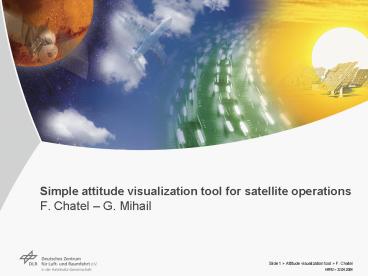Slide 1 Attitude visualization tool F' Chatel
1 / 18
Title:
Slide 1 Attitude visualization tool F' Chatel
Description:
Slide 1 Attitude visualization tool F. Chatel. 56882 22.06.2006 ... screen saver mode - offline mode - online mode. Telemetry extraction module ... –
Number of Views:22
Avg rating:3.0/5.0
Title: Slide 1 Attitude visualization tool F' Chatel
1
Simple attitude visualization tool for satellite
operationsF. Chatel G. Mihail
2
Simple attitude visualization tool for satellite
operationsPresentation contents
- BIRD mission
- Motivations for a visualization tool
- Realization SatelliteSim Tool
- Operational use
- Planning of pictures
- Investigation of eclipse exit and sun-pointing
- Investigation of picture acquisition
- Future developments
- Conclusion
3
Bi-spectral Infra-Red Detector (BIRD)Mission
status
- Mission (launched 22.10.2001 from India 1.5
years expected lifetime) - Test new generation of infra-red sensors
- New micro satellite technologies demonstrator
- Hot spots investigation (volcanic activity,
forest/coal seams fires...) - Gyroscope assembly failure
- Misleading data, pertubation of ACS reaction
wheel saturated - Sun pointing loss battery depletion... No
contact possible! - Mission has been recovered
- Gyroscope assembly switched OFF
- 3/4 wheels lost, payload in good shape
- New board software required (ACS with coils and
sun sensors)!
4
Attitude visualization toolMotivations and
requirements
- New ACS software investigation
- Flight Dynamics experts work with 2D plots
- Conventions? (Reference frame, Euler sequence...)
- Overview requires to combine plots together
- Simple attitude visualization tool
- Complement to flight dynamics analysis
- Simple (no interface to real-time processor,
offline analysis) - Quick development (6 months)
- Low cost (part time job)
5
SatelliteSim toolStructure
Propagator module
TLE file
Conversion module
Loading module
Program - screen saver mode - offline mode -
online mode
Real model
Virtual model
TM replay module
.tlm file (ASCII)
Telemetry extraction module
Original TM archive of the S/C
6
SatelliteSim toolStructure (Ctnd)
7
SatelliteSim toolRealization - industry drawing
simple representation
8
SatelliteSim toolRealization - Bird virtual model
9
SatelliteSim toolRealization telemetry
extraction module
- The extraction module aims at retrieving the
parameters of interest from the satellite raw
telemetry files. These parameters are interpreted
and formatted into a specific file format (ASCII)
that will be later used by the core program. All
calculations for the other derived parameters are
performed at this stage. The highlighted part on
figure corresponds to a single TM stamp that will
be played by the satellite simulation tool.
10
SatelliteSim toolRealization summary of TM
pages
11
SatelliteSim toolRealization propagator module
- An orbit propagator has been included in the
SatelliteSim tool - The propagator module uses the two lines element
format as input. It is a classical propagator
program including the NORAD SGP4/SDP4 model for
orbit perturbations. - It gives as output
- - ECI coordinates
- - ECI velocity
- - Longitude and latitude
- - Height
- - S/C velocity
- Animation (orbit propagator)
12
SatelliteSim toolRealization - core program
- The main application has been developed under
Visual C, making use of the OpenGL library for
the graphical part. The rotations applied to the
virtual model are coded as rotation matrices. - The core program loads the virtual model at
start-up. - Two modes are then available
- 1. offline mode- presentation mode for the
satellite, in which the model can be zoomed in,
zoomed out or rotated. - 2. online mode - used to replay telemetry data,
which have been extracted by the telemetry
extraction module. This mode displays the
attitude motion of the satellite and offers the
option to browse the TM parameters on six
specific display pages. The start frame as well
as the replay speed (fast or slow) is settable. - Animation (online / offline mode)
13
SatelliteSim toolConventions
- 3D scene presented in orbital frame
- Based on ONS quaternion, giving rotation to
orbital frame - GridEarth (Z axis), perspective pointflight
direction (X axis)
14
Operational useInvestigation of eclipse exit and
sun-pointing
- Attitude uncontrolled during eclipse
- No sun reference!
- Slew to sun at eclipse exit
- Takes sometimes long
- Attitude Control performances (Quality of
sun-pointing) - Reflected in battery charge
- Anti sun-pointing observed!
- Depends on magnetic field vector in satellite
frame - Visualization helps to explain some safemodes
- Animation
- Eclipse exit 093929 (begin of penumbra)
15
Operational usePlanning of images
- No automatic image acquisition
- Equipment activities must be commanded
- Commands shall follow a specific timing
- Warm up of infra-red sensors
- Equipments configuration
- Related to acquisition time
- Prediction of satellite position is required
- Comparison with target coordinates (acquisition
optimal time) - Sun-pointing attitude during picture acquisition
- Rotation with coils too long and not precise
- Coupling with magnetic field complicates the
controller
16
Operational useInvestigation of image acquisition
- Success of image acquisition ( 4 minutes)
- Orientation and stability are key factors
- Visualization allows quick assessment
- Animation
- Madagascar acquisition between 091700 and
092100 - Red Sea Erythrea acquisition between 095800
and 100200 - Result (image data)
- Madagascar
- looks like Saturn rings (horizon) !
- Red Sea Erythrea
- successful after initial rotation
17
Future developments
- Simulator
- Implementation of equipments (mathematical
models) - Failure investigation
- Improvement of celestial simulation
- Earth map and celestial bodies (Moon, Sun,
planets...) - Allows blinding and pointing analysis
- TM processor
- Coupling with real-time TM processor
- Interpretation of TM values (thermal, blinding)
- Forecast of hazardous situation (antenna pattern)
- Display of extra information
- Position of GPS or other satellites (ISL)
18
Conclusion
- Attitude visualization tool
- Successfully implemented during operations
(offline) - Useful complement to Flight Dynamics
- Future developments
- Simulator or coupled with TM processor
- Currently great activity
- Didactical effect































